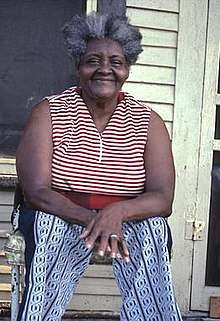Georgia Speller
Georgia Speller (1931-1987) was an African American artist known for her colorful, dynamic drawings and paintings on paper.[1]
Georgia Speller | |
|---|---|
 Georgia Speller on her front porch in Memphis, Tennessee | |
| Born | Georgia Verges 1931 |
| Died | 1988 (aged 56–57) |
| Nationality | American |
| Known for | Painting and Drawing |
| Movement | Contemporary Art |
Early life
Speller grew up the daughter of a blacksmith in northeast Mississippi, in a town called Aberdeen. She learned to draw at a young age, but did not hone her craft until she was encouraged to do so by her husband Henry Speller, who was also an artist.[2][3]
Career
Speller's evolution as an artist alongside her husband was outlined in an interview:
"She had learned to draw as a child but became actively involved in her art only after being encouraged by her husband. It was an important element of their life together. Often,they engaged in playful yet serious competition, drawing the same subjects and comparing results. "I ain't near as good as Henry" was her assessment. "She done come to be a whole lot better than me" was his."[4]
Although her work is peppered with architectural paintings and drawings of houses, train stations, and cityscapes, the majority of her oeuvre comprises orgiastic, ecstatic scenes of revelry in nature. These orgies occur outside of temporal bounds, often with the moon and sun simultaneously in the sky. Women are often the dominant, or at least mutually benefiting, partners depicted in Speller's work. Art historian Xenia Zed analyses her work as "the revisionist feminist of the nineties; the sexual exhibitionists of the sixties and seventies; the romantic/erotic/pornographic gaze; the symbolic that can range from thoughts on African retention to psychoanalysis."[5]
Collections
Her work is included in the collections of the Metropolitan Museum of Art[6] and the High Museum of Art.[7]
References
- Coker, Gylbert Garvin; Arnett, William (2001). "Souls Grown Deep: African American Vernacular Art of the South". African American Review. 35 (4): 660. doi:10.2307/2903291. ISSN 1062-4783. JSTOR 2903291.
- "Georgia Speller | Souls Grown Deep Foundation". www.soulsgrowndeep.org. Retrieved 2019-06-11.
- Finley, Cheryl; Griffey, Randall R.; Peck, Amelia; Pinckney, Darryl (2018-05-21). My Soul Has Grown Deep: Black Art from the American South. ISBN 9781588396099.
- Arnett, William (Summer 2019). "Handy Man". Souls Grown Deep: African American Vernacular Art. I: 385.
- Zed, Xenia (Summer 2019). Arnett, William (ed.). "Folk Theory: Laughing with Legba". Souls Grown Deep: African American Vernacular Art. 1: 414.
- https://www.metmuseum.org/art/collection/search/653751
- Candid. "Souls Grown Deep Foundation Donates Works of Art to High Museum of Art". Philanthropy News Digest (PND).